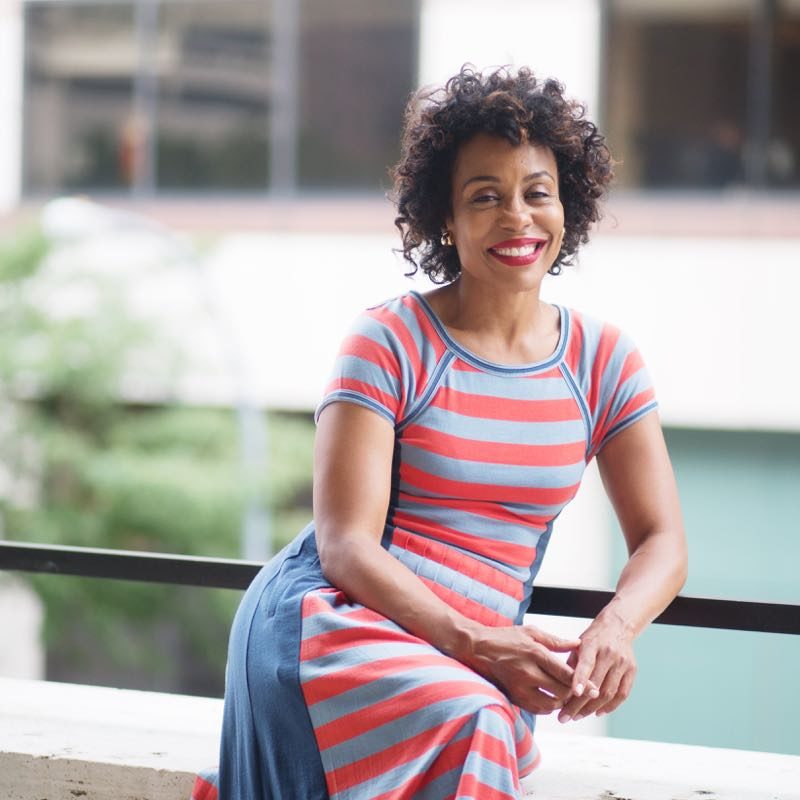An Interview with Karen Pittman
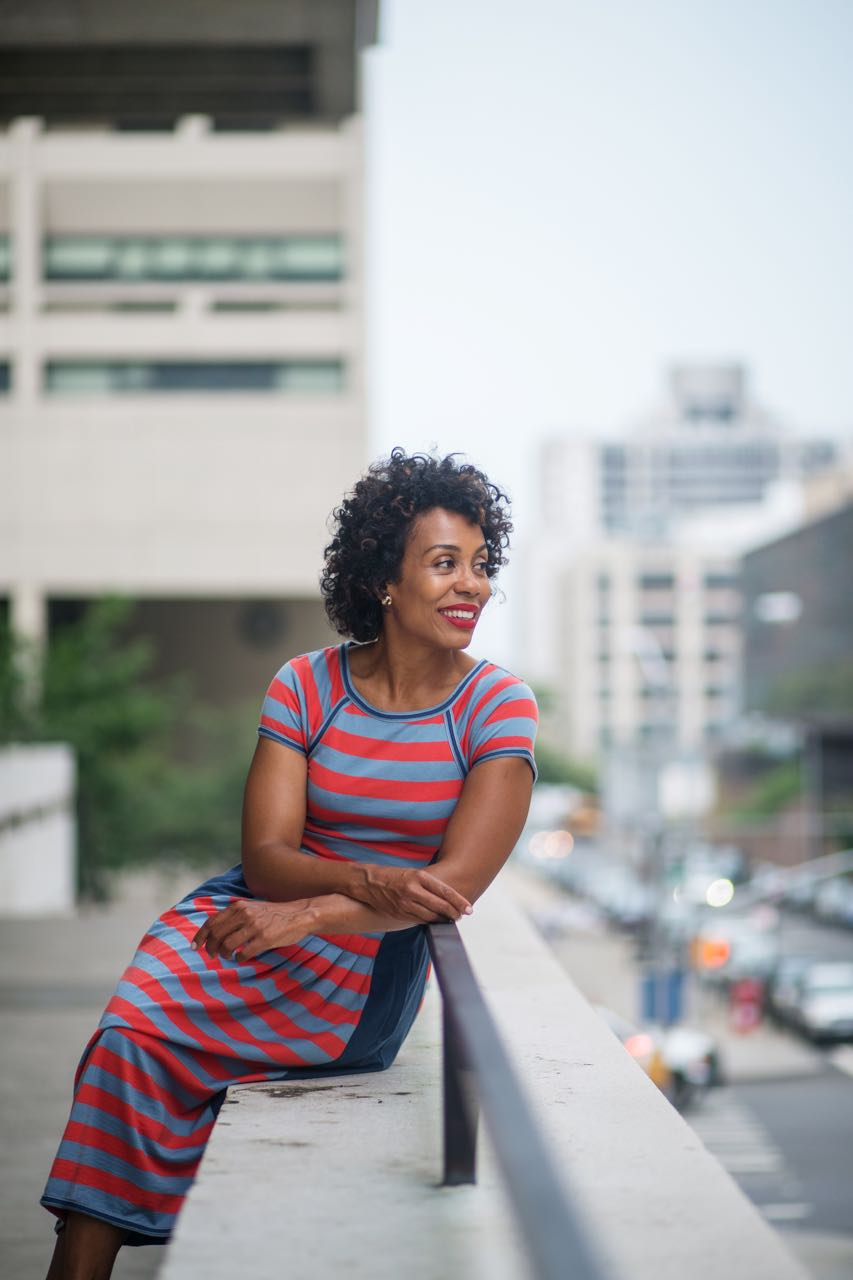
Written by Victoria Myers
Photography by Tess Mayer
August 8th, 2017
In Dominique Morisseau’s new play Pipeline at Lincoln Center Theater, Karen Pittman plays Nya, a teacher and single mother who is attempting to give her son as many opportunities as possible. In this performance, like in her others, Karen has been praised for the layers and complexities she portrays in her characters. A few years ago, she came to the theatre world’s attention in Disgraced, first at Lincoln Center and then on Broadway, and shortly after that, followed it up with a leading role in King Liz at Second Stage, both of which earned her accolades. All the more impressive, given that acting is actually Karen’s third career. Thirteen years ago, after working in both the music industry and finance, she auditioned for NYU’s Graduate Acting program—while pregnant with her first child. We recently sat down with her to discuss what drew her to Pipeline, her acting process, her path to acting, and more.
When you got the script for Pipeline, what was the first thing that drew you to the character and wanting to be part of the show?
I was drawn to the story and the writing. There’s fertile ground in me for the character—I’m a single mother, I do a lot of co-parenting stuff, I have a son, my mother was a teacher, my father was a science teacher—there’s a character [in the play] named Mr. Peterson who’s teaching science and inspiring his students, and that was my dad. I think the thing that drew me the most to the story was that my mother died on Election Day 2016, and I suddenly had a brand new perspective on what it meant to be a mother. I thought, “There’s no other time in my life where I will be this open and this empathetic to the journey of mothers in my life.” Part of the grieving process is to re-examine relationships with the person who has died, and so this play has been a gift for me in that way because it allows me to explore developing a character with a deep empathetic understanding of what her trajectory is and the effect that this mother will have on her son if she does not take care of him or find a way to save him. That probably was a thing where I thought, “Wow, this story is really important and I have to do it.” In fact, there were other jobs that were being brought to me before I started working on this one, but I thought “Nope, can’t do that, I have to do Pipeline.” It just felt like the most important thing for me to do with my craft this year.
In the play, there’s a lot left unsaid about your character and her backstory, and some things are implied and hinted at but not fully stated. How did you approach the unknowns in the script?
The way I read a script is I take all that the playwright says about the character, the playwright’s notes as you’re working through the lines, what the other characters say about the character, and then what the character says about herself, and that way you can draw a whole picture of her. I think I found, in the playing of it with this particular group of artists and actors, that there is a wounded child in Nya in the same way that there is a wounded child in Omari. Healing him is healing herself, and that is what keeps me focused on getting towards that end moment in the play where she says, “It’s part of his inheritance that he’s dealing with all this pain, and I take responsibility for it.” As a mother, I know that if your child is dealing with something, more often than not you’re dealing with the same thing. So those are the areas where I fill in the gaps psychologically. Dominique gives you so much in this play to work with, and having her in the room is really important. She brought in her own experience as a teacher, her experience as an actress and a writer, and Lileana [Blain-Cruz, director] too fired my imagination with bringing in the projections and the music and her collaboration with the other visual artists. The whole world became very, very real to me. I didn’t feel like I had to fill up too many of the empty spaces. In human beings there are these mysteries, these nuances of character that we don’t always have a chance to dig into. I’m okay with the parts of Nya that I don’t know. At this point in her journey, I feel like I know a lot about her.
One of the things that I talked to Dominique about was her use of language, and how it’s both naturalistic and heightened at the same time. What was that like for you, working on that type of language?
I’m trained classically at NYU graduate acting, and it takes a full use of your instrument. I have to warm up 20 minutes before the show to really make my body available to it. When you’re working with a really great playwright, she knows what words to use—nouns, verbs, adjectives—to wind up the story, and even the audience feels it when it’s getting to a place of heightened emotion or heightened conflict. Everyone can feel when it’s getting there if the playwright is using the words that are specific to each character in that moment. Dominique does a fantastic job of that. She’s a playwright at the top of her game.
Something that comes up a lot in interviews is women and likability, and making a character likable. What are your thoughts on that in regard to this character and your performance?
I don’t like to create characters where I worry about that. I don’t care if Nya is likable. I think as women we are concerned a lot with that, but I think this is a moment in her life where she is not concerned with whether or not she’s liked—she wants to save her son. But one of the things I was concerned about, because she is a deeply flawed character at this moment in her life, is ennobling her journey, and that’s something that I think every human being should have: the dignity of their journey and the ability to have a character that reflects that journey and ennobles it well. I don’t think that there are enough characters that reflect the nobility, the creativity, the dignity of African American mothers. We often see them in the most downtrodden, most difficult moments of their lives where they are truly spiritually and morally challenged. I wanted to make sure that if I showed all of Nya’s humanity, that you’d also see her striving to be excellent.
That likability thing gets in the way of us as women and also in the way of us as actors, trying to have a character that everyone laughs at and they’re all comfortable with. I feel less of it with having a female director of color and an African American female playwright. We talked a lot about displaying all of Nya’s frailties and flaws from the very beginning. She is a woman who is dependent on things to keep her focused, to keep her going, to help her cope, and there’s a kind of weakness and frailty you see in human beings like that, but also wanting to follow that journey with a great deal of heart and compassion.
Did your approach to that change throughout the rehearsal process?
I initially was trying to find a way into letting her fall deeply into negative emotion, and then pulling her up so that she could rise above it and teach a class as she does in scene four about Gwendolyn Brooks, so that you see her dealing well and her striving to be okay. But she’s not, because there’s this ghost of her anxiety and her pain and her fear following her around the room and then it catches up with her. She is constantly running from this thing, not because she’s afraid that her son is going to be taken away from her, but because she wants him to survive, and that’s a different thing. Being fearful is different from striving to be okay.
Initially in the rehearsal process, I was dealing a lot with the negative: the fear, the anxiety. Once the audience came in, I realized how important it was to make sure that they knew from the beginning that Nya was striving to make things alright versus running away to keep things at bay. Because that is the instinct, I think, in all human beings. What we are hoping for is to be okay, not to not die, but to live. So the process upon which that happened was very slow, but once the audience came in I realized how important it was to have that message out there that she wasn’t falling apart, but she was trying to stand up.
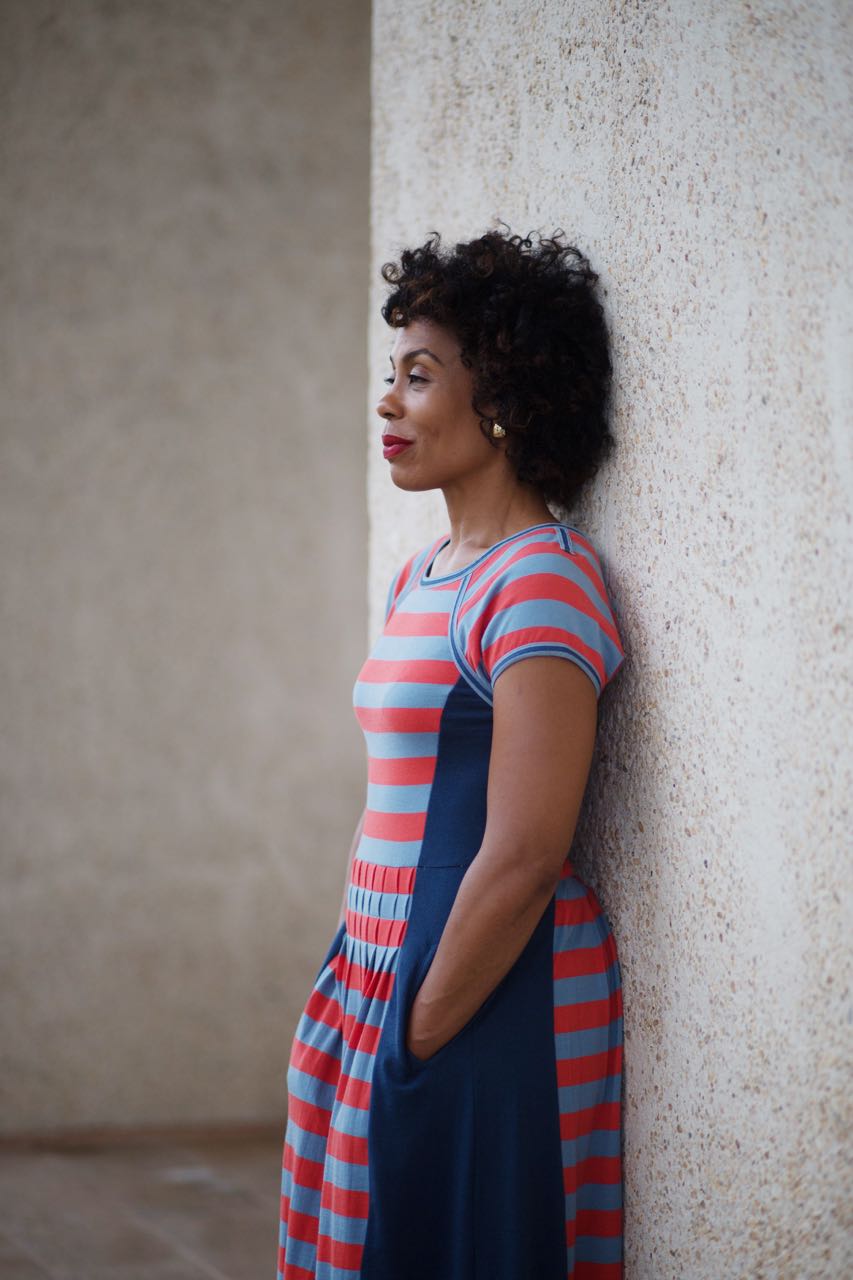
I want to talk a little more about process. You mentioned before when you get a script, you look to see what the other people say about the character and what the character says about themselves. Are there other things that you do that you find helpful as a way into the character and into the story?
I talk a lot with the playwright, because I am a vessel for her story. I collaborate and talk a lot with the director. I stay around the rehearsal room a lot, because I find if I am trying to work at it at home, it’s not as useful as if I am in the world of the play, even with the stage managers walking around and the fake props that we’re using. Those things actually help me a lot. I try learn my lines as early in the process as possible. We try lots of different takes on what the character might do, what her behavior might be in the rehearsal process, so that when we get to previews and in production, there’s already a language of behavior that Nya might typically reach for and that I’ll know what the things are that we collaborated on. I still go over the script every single day, even on my day off, the play being the Bible for me. I’ll sometimes call on the director and say, ”Hey, I’m having a hard time with this,” and just talk through something, still collaborating even though they’ve gone onto other projects and doing other things. The process is never-ending for me. My brother is a football coach and he says, “We’re always in process Karen, no matter if you’re in the training room, if you’re in spring training, if you’re in the weight room, you’re in the end zone, you’ve got two championships, you’ve got four championships. You’re always in the process of getting to the next place or the next level,” and I think that that is so true of acting and so true of theatre work. It’s why it is the mountaintop experience for me.
Do you use things like art or music as part of your process in terms of how you think about the character?
Yes, I do. I have a group of songs I listen to every night. They include songs from the movie Road to Perdition, songs from the movie Moonlight, a song that we use in the play, “Jesus Children of America,” that is sung not by Stevie Wonder but Laila Hathaway. I use lots of different songs with no words at all that help me to stay focused on the process of getting myself into the seat of Nya’s soul. I find that music is the most provocative tool that I use.
I am the daughter of scientists, and I very much feel that if you’re not in the world of the play, you’re not in that world literally. I have to be there to be there, and dealing with all of the things and props, and hearing the songs and music, and projections, and the whole thing. It’s possible now for me to completely immerse myself in it as a part of the work that we’ve done over the last eight weeks of rehearsal and previews, but also I’ve been acting for ten years now, and there’s no other way to do it except to just go all the way into the water, go in the deepest end that you feel like you can go to and then keep swimming.
The physicality you use for this role is different than in some of your previous work. How did you approach creating the physicality of the character?
I think of theatre work as athletic work, so I work out a lot. I don’t miss a day of working out when I’m doing theatre work because I find that I have to adrenalize my body. At some point in the process, Lileana said, “You know, Karen, your spine is very upright and I wonder how upright Nya’s is?” and I agreed with her. I thought, maybe she’s standing a little too straight. At some point during the second week of previews, I started to lean to the right as if the weight of Omari’s challenges were right here [on this shoulder] and then by the end of the night it had moved over to this [shoulder] so that her body is kind of leaning forward in a different way. I think that acting is transforming your body physically into a character, and that transforms the audience before you start speaking. They know body language is 98% of it, so that’s an important part of all the work I do and the characters that I do.
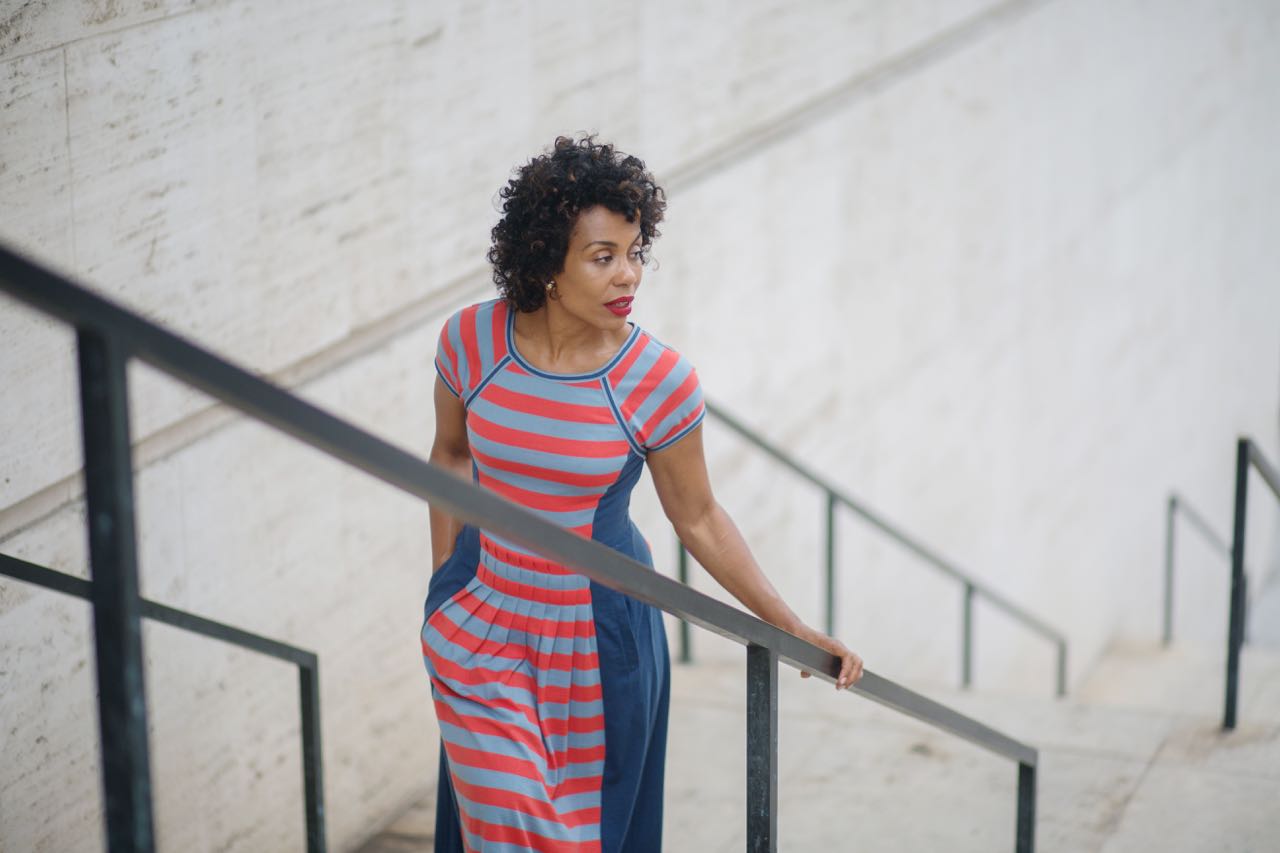
I know you came to acting a little bit later, and I was wondering if you’d talk a little bit about your journey and the decision process of changing direction and going into acting professionally?
I came to New York after college and I started working in the music industry for a few years, then I went and took a left turn into venture capital and made a good little piece of change in that for a few years. But I was really quite miserable. All the things that people had told me would make me happy, they weren’t making me happy, none of those things. I was miserable over it. I didn’t feel like I had much purpose, and I didn’t feel like I was living, as corny as it sounds, my best life. I thought I was living someone else’s life.
I consider myself to be a pretty big risk taker, or someone who follows her instincts. So, short version: I got married, got pregnant, and I was like, “If I have a son and I’m this miserable, this is going to be fucking horrible.” So I thought, “Well, I don’t want to go back into the music industry, but I love acting, maybe I could do that.” I went to an acting coach I had at the time and he was like, “You should apply at my school, which is the New School,” I was like, “Oh, okay, cool,” and I thought I should probably apply somewhere else too, and he said NYU. I was like, “Is that place good?” and he was like, “Yeah.”
I went in there completely naïve and auditioned while five and a half months pregnant. Teachers were like, “Really?” I think they were kind of impressed with my boldness. Then I got in. I think that part of my experience started before I got into grad school. I’ve been constantly looking for the way to live the life that is my life, not his life, or her life, but what is the life that I’m supposed to have while I’m here? What does that look like? And even the act of auditioning for grad school, I suddenly found that life.
So 13 years later, I’m here. My son is now 13. I had a daughter a year and a half out of grad school and she’s now seven. It’s just been this incredible journey. I did not want to be a mom that was waiting until after my career was over to develop myself. I wanted to be doing it at the same time.
Did you ever have a moment during all that where you were like, “Oh God, there are challenges here that I didn’t know about”?
All the time. I think that’s part of why I relate to Nya, because she starts out in crisis and she ends in less of a crisis, but she’s not figured anything out. I think that as a mother that is part of it and certainly as a single mother and an actress. None of this shit I planned, but I could not see my life in any other way. I’ve come to embrace it, and in embracing it, all the anxiety and fear and feeling of, “Oh God, can I do this?” completely disappears. Once I just decided this is my life and I’m going to live it, it does go away. But that is a daily practice and that is a habit I’ve had to build.
A few years ago, right before I did Disgraced, I had a very low point where I thought, “You have got to go make some money. You can’t do this acting thing. This is stupid. You can’t do this.” Then I had a heart to heart with my sister and it was like, “You’re going to act or you’re not. Shit or get off the pot.” She happens to be one of those people in my life that can tell me the real deal and I actually listen. It’s a daily practice of not feeling like you’re under the gun failing. The moments where I accept my life for what it is are the moments where I’m the happiest.
What was the experience like of going to school while having a newborn child? From what I know of grad acting programs, they’re intense, and they’re in no way built for people to have lives, let alone a child.
Before I had gone to grad school, there weren’t really any other women there who had children. That program had been around for decades and it was led by Zelda Fichandler, who was the mother of regional theatre in America. I had a great group of actors with me that supported me. I was not a single mother at the time, so I had a husband who supported the work that I was doing. It was revelatory in many ways, because being a mother brought me back to some childlike experiences, and being creative and looking at things in a new way. I’m an optimist by nature, so it was kind of magical. I learned a lot from the female teachers at NYU about using my voice and about having an opinion and what it meant to be an artist of courage and integrity. They really made the journey of an actor about something I feel very strongly that we all have to do, which is how we are of service to humanity. A lot of my work has been socio-political conversations and very in line with my personal politics, and that really was the genesis of the conversation for me about what kind of work I wanted to do. And just getting through the program with a child and this desire to make it work. Once I went through the program at NYU with my son, I knew that I could be an actress with a child because I had already done it. I’d lived that life for three years at NYU grad acting, so it was intense, but I’m an overachiever and I love a challenge.
Right after you graduated, when you had two small children, was that difficult? Especially if all of your other classmates had more freedom to audition whenever and work wherever.
That was the hardest period. After I left grad school, I found out I was pregnant. I hadn’t planned it at all. I had gotten really down on myself at that point because I thought, “Well, you went to school for three years and now you’re pregnant a year and a half out of grad school, you fucked up.” I spent a good portion of that time feeling really sad about the direction that my personal life had moved in, but when my daughter was born, the experience of being a mother again gave me a new perspective on acting and what it meant to be of service. That probably though was the most difficult time, without a doubt. Being in school, there was a lot of support, and the teachers were loving on you and Zelda was like, “You can do it.” It was different once I was out there and trying to figure out how to make it work. I think the thing that saved me was Disgraced. At my lowest point, that character was everything I wanted to be but had yet to fully embody in my life. So I got the chance to play out this really powerful, intelligent, put together, wise beyond her years woman, and while my personal life was slowly cratering, she gave me hope. She gave me my optimism back. That was the most difficult time, and since then it’s gotten easier.
I ask actresses a lot about they handle typecasting and things like that, especially when they’re young and just starting out. Did you find being a little older helpful in terms of navigating that stuff or did you find there were challenges that came with that?
Older. That’s the trickiest word and no actress wants to try to navigate it. I read that article you did with Quincy, and [like her] I said yes to everything, which helped me to build relationships that I still depend upon to this day. But a lot of my life experience allowed me to step out of grad school and start working immediately. It wasn’t like I stepped out and no one was looking for mothers or would-be bankers or someone who maybe could be a lawyer or someone who understood the dynamics of what it meant to be a mother. Almost immediately I started working. Whereas some of my friends who started grad school right out of college, they had to wait a few painful years to continue to develop their craft until the market opened up for them in a way. I did not have the challenge of a transition into the industry where I wasn’t working. The challenge came in learning how to balance my work and my life as an actor, the financial aspects of balancing my work or lack of work, with my very full financial responsibilities with my children. That was the part of the dynamic for me that was the challenge. But when I left grad school, what was encouraging for me was that there were parts available; the question was whether or not I could get in the room and be in there with all those other really great African American actresses who had been out there for years. My challenges came later.
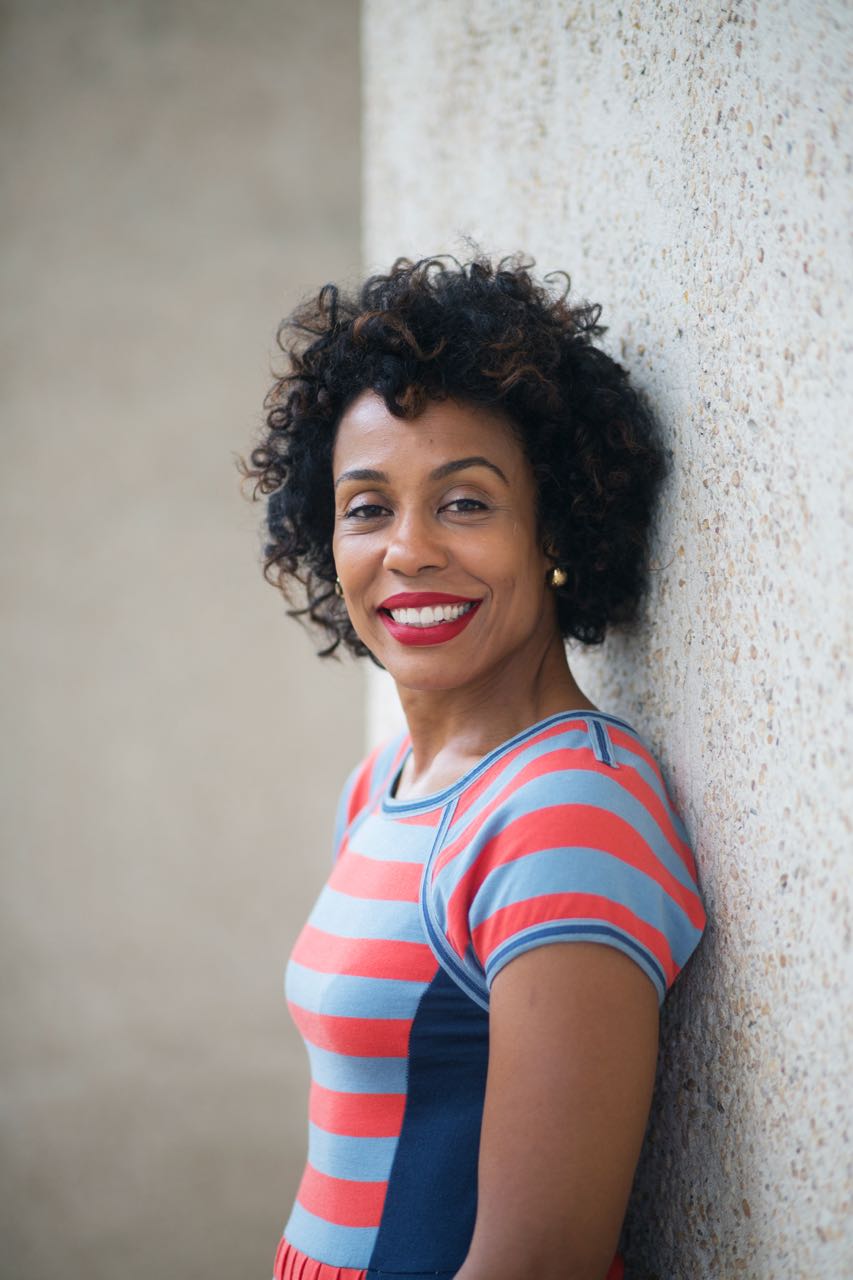
You’ve been part of a lot of new work. From your perspective, how do you think new work can be better developed?
I feel like dramaturgy and play development at non-profit theatres is not as strong as it has been in the past. Playwrights like August Wilson worked with Marion McClinton for years in different regions on his plays before he came to New York City. I don’t think that we do enough to develop playwrights and dramaturgs and directors in our industry. I also think it’s important to have young people come to the theatre and to know the importance of going into theatres and how to listen and how to engage with this kind of art. We don’t do that enough. We use it as an education tool, but we’ll put an iPad in the hands of a child before we’ll have them write something down, or we’ll take them to a movie before we’ll take them to a play. I find the theatre is the most visceral experience that you can have. You’re seeing the reflection of yourself on stage, and that is transformative. Having more young people earlier in their lives, I think, can be a part of developing plays and playwrights.

